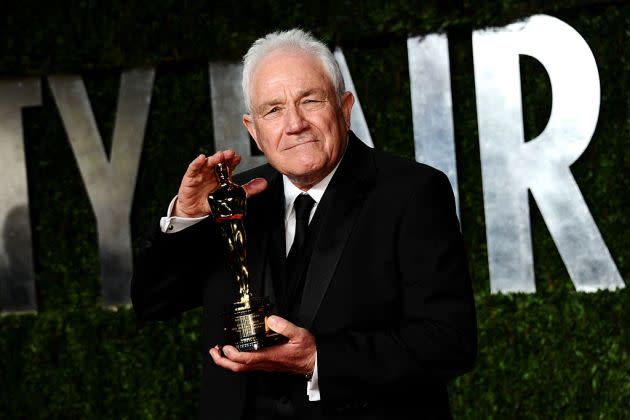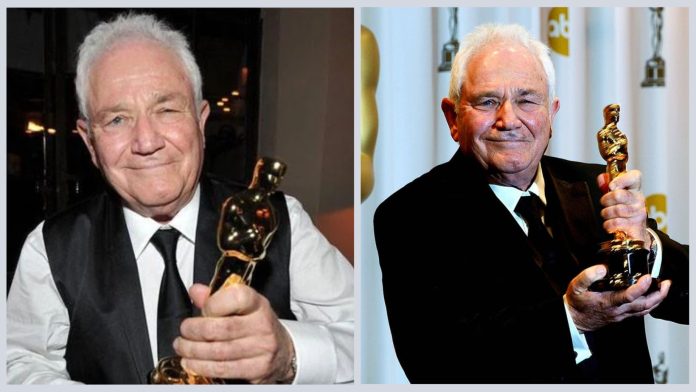David Seidler, a British-American playwright and screenwriter, gained acclaim for his contributions to “The King’s Speech,” which earned him an Academy Award and a BAFTA for Best Original Screenplay. Born in London on August 4, 1937, Seidler relocated to the United States during the early stages of World War II.
He pursued his education at Cornell University, where he formed a friendship with writer Thomas Pynchon. Seidler’s early ventures in entertainment involved writing translations for Japanese monster movies and making his mark in television with the 1960s series “Adventures of the Seaspray.”

Among Seidler’s notable works are the 1988 biographical film “Onassis: The Richest Man in the World,” starring Raul Julia, and the 1988 comedy-drama “Tucker: The Man and His Dream,” which he co-wrote with Francis Ford Coppola.
Key Facts About David Seidler
- Born on August 4, 1937, in London, England.
- Moved to the United States during World War II.
- Wrote for Japanese monster-movie translation dubs and television series “Adventures of the Seaspray.”
- Notable works include “Onassis: The Richest Man in the World” (1988) and “Tucker: The Man and His Dream” (1988).
- Best known for “The King’s Speech” (2010), which won the Academy Award and BAFTA for Best Original Screenplay.
- The script for “The King’s Speech” was inspired by his personal experience overcoming a childhood stutter.
- Passed away on March 16, 2024, during a fly-fishing trip in New Zealand, at the age of 86.
- His work on “The King’s Speech” was also adapted into a play performed on four different continents, including at London’s West End.
- Other writing credits include animated children’s features “Madeline: Lost in Paris” (1999) and “Quest for Camelot” (1998), and the 2016 film “The Queen of Spades.”
- Had multiple documentaries, limited series, and feature films in development at the time of his death.
- Won his first Writers’ Guild award for “Onassis: The Richest Man in the World” and also cowrote Francis Ford Coppola’s “Tucker: The Man and His Dream.”
- The stage adaptation of “The King’s Speech” opened in the West End in 2012.
- Drew on his experience growing up with a stammer for the screenplay of “The King’s Speech.”
- Honored with two BAFTAs and the Humanitas Prize for his “King’s Speech” screenplay.
- Dedicated his Oscar to “all the stutterers around the world.”
David Seidler Illness And Health Condition: Was He Sick?
In his later years, David Seidler faced a significant health hurdle. At 73 years old, he received a diagnosis of bladder cancer. Despite medical recommendations for extensive surgery or chemotherapy, Seidler opted for a different route.
He chose to forego conventional treatments and instead relied on visualization techniques to confront the illness. This unconventional approach involved mentally picturing a “lovely, clean, healthy bladder” for a two-week period, which he believed played a pivotal role in his recovery. According to Seidler, after this period, the cancer vanished, and he remained cancer-free for over five years.
Oscar-winning King's Speech screenwriter David Seidler dies https://t.co/325WNIVqud
— BBC News (World) (@BBCWorld) March 18, 2024
Seidler’s decision to reject traditional cancer treatments in favor of visualization techniques sparked controversy. It’s crucial to recognize that while this method proved effective for Seidler, there exists no scientific backing to validate the efficacy of visualization in treating cancer or any other ailment. The effectiveness of visualization as a therapeutic approach lacks support from large-scale studies and remains a subject of debate within the medical community.
Seidler’s journey with cancer and his unconventional approach to treatment underscore the intricate nature of health-related decisions. His story emphasizes the significance of personal beliefs and experiences in shaping one’s approach to health challenges. While conventional treatments typically serve as the primary course of action in healthcare, individuals may discover solace and healing in unconventional methods, particularly when these methods deeply resonate with their personal convictions and experiences.
David Seidler Career Explored
David Seidler’s career spanned multiple decades, leaving a significant impact on the film and television industry. Born in London in 1937, Seidler relocated to the United States during World War II. He pursued his education at Cornell University, where he studied English and formed a friendship with American writer Thomas Pynchon. Seidler’s early professional endeavors included writing for television series and animated children’s features, such as “Madeline: Lost in Paris” (1999) and “Quest for Camelot” (1998).

Among Seidler’s noteworthy works are the 1988 biographical film “Onassis: The Richest Man in the World” and the 1988 comedy-drama “Tucker: The Man and His Dream,” which he co-wrote with Francis Ford Coppola. However, his most acclaimed achievement is “The King’s Speech,” a film depicting the true story of King George VI overcoming his severe stutter with the assistance of Australian speech therapist Lionel Logue.
Starring Colin Firth as King George VI and Geoffrey Rush as Lionel Logue, the film earned the Best Picture Oscar in 2011. Seidler’s script for “The King’s Speech” also garnered him the Academy Award and a BAFTA for Best Original Screenplay.
In addition to his contributions to film, Seidler’s stage adaptation of “The King’s Speech” has been translated into numerous languages and performed across four continents, highlighting the global resonance of his storytelling. His diverse career also encompasses writing for other films and television series, such as “Son of the Dragon” and “Come On, Get Happy: The Partridge Family Story.”
Seidler’s personal journey, marked by overcoming a childhood stutter, deeply influenced his empathetic portrayal of George VI in “The King’s Speech.” He drew inspiration for the script from his own experiences, particularly after surviving a cancer scare in the early 2000s, which motivated him to pursue his lifelong dream of bringing this story to life.
Also Read: Philip Brewer and Christina Joel Hardy Accused of Fraud and Murder of Elderly Man in Washington

